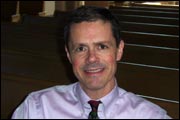Minister fasts 30 days to protest Iraq war
Members of the First Unitarian Universalist Society in Syracuse, N.Y., joined the Rev. David Blanchard's fast for peace
Blanchard began his fast September 15. Once a week he invited people to join him at the dinner hour to have herb tea and conversation in the church parlor. He concluded the fast Thursday night--which was Yom Kippur, the Jewish Day of Atonement--with a simple meal at the church. Joining him were about 25 society members who participated in the last three days of the fast.
The group began with each person eating a single ripe strawberry and then sharing soup that Blanchard made and bread that others brought. The group also read the names of the soldiers who had been killed in Iraq since the fast began and spent an hour in reflection about their experience of fasting. In an interview the next morning, Blanchard said, “We had a very rich conversation and a very peaceful, meaningful end to the fast.”
Earlier in the week, in an op-ed column in The Syracuse Post-Standard, Blanchard wrote:
Each of these people will set in motion their own ripple of influence and inspiration. And it will go on and on--hastening, I trust, the inevitable harmony of peace. And it will happen one person at a time.
I grieve for each of the soldiers who sacrificed their lives during this period of my own relatively insignificant sacrifice. I mourn also for the dead Iraqis, whose numbers we will never know.
Blanchard, who has been minister of the Syracuse congregation for 16 years, wrote that the fast “was inspired by a deep spiritual longing for justice and peace. . . . It was a response to the still, small voice within.”
Blanchard said that response from the community has been mostly positive, that some Syracuse University students joined in the fast, and that he’d received messages of support from Unitarian Universalist colleagues, a peace fellowship in Pakistan, and Unitarians and Quakers in England.
At the end of his fast, he said in the interview, he felt “almost a sadness. A significant experience was ending for me and I was transitioning back to real life.” He expects that the fast will be a transformational experience for him, but that it’s too soon to tell what that will mean.
“I don’t have the answer today,” he said. “I do know there was a heightening of my awareness of things like simply being alive, of what food tastes like, of the blessings of life itself and the beauty of nature. Sometimes we sort of rush past all that. I see myself as having attained a new peak in my life and my hope is that I can sustain an awareness of this experience.”
Blanchard said he was able to maintain his full schedule and feel well during the fast despite his 700-calorie-daily diet. “It comes down to the way one’s physical energy is freed up from the hard work your body does to digest food,” he said. He said he tried to use the time gained by not cooking and eating to be meditative and to journal.
The fast has educated Blanchard about the importance of food in social interactions. “There was some awkwardness in discovering how often I was ready to say to someone, ‘Let’s have breakfast or lunch,’” he said. “We build our social contacts around food.” The monthly “Movies with the Minister” night was a challenge for him. “I’m the one who goes and gets the pizzas,” he said. “That was hard, but I found that I really didn’t want any.”
He timed the fast to end on Yom Kippur because of its religious significance. “It honors the spiritual principle of forgiveness and atonement for what we’ve done wrong,” Blanchard said. “We have an obligation to tend to and care for the Iraqi people.”








